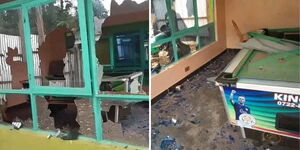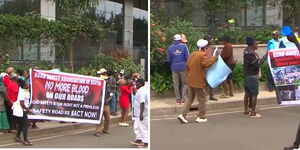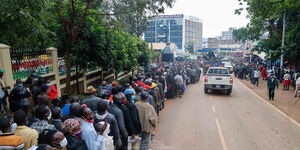Raphael Tuju has penned his third open letter to Chief Justice Martha Koome, expressing deep concerns over what he describes as "outrageous rulings" by five Supreme Court judges in the ongoing legal battle involving a bank and a 27-acre piece of land in Karen, Nairobi.
In this letter, dated March 21, 2025, Tuju expresses deep concerns over the conduct of Supreme Court judges in his ongoing legal battle with the East African Development Bank (EADB), which has now escalated into a broader conflict with the judiciary.
Tuju, in the strongly worded letter, draws a stark comparison between the current situation in Kenya and the infamous 1857 US Supreme Court ruling in the Dred Scott case, which upheld slavery and contributed to the American Civil War.
He warns that an irresponsible judiciary can have catastrophic consequences for a nation, especially one as fragile as Kenya, which he describes as a "geographical phenomenon" rather than a cohesive nation-state.
Tuju argues that the Supreme Court of Kenya (SCOK) judges have been reckless in their language and actions, particularly in their handling of the 2022 presidential petition, where he claims their use of terms like "hot air" and "wild goose chase" exacerbated an already volatile political environment.
The crux of Tuju's grievance lies in the conduct of the five Supreme Court judges that escalated in October 2024, when five judges—Deputy Chief Justice Philomena Mwilu, Justices Mohammed Ibrahim, Smokin Wanjala, Njoki Ndung'u, and William Ouko—recused themselves from hearing his appeal concerning a Ksh4.5 billion debt owed to the East African Development Bank (EADB).
This unprecedented move came after Tuju accused the judges of bias and lacking impartiality, leading them to conclude that their continued involvement would not serve the ends of justice.
In his letter to Koome, Tuju alleges that the judges have repeatedly violated court procedures, including denying him his constitutional right to a rejoinder and dismissing his evidence on false grounds.
Tuju claims that the judges ruled his property could be auctioned, with the possibility of compensation if he later won the case—a precedent he describes as both immoral and unprecedented. "The law cannot be the foundation of morality," Tuju writes; "it is the other way round, your Honor. Morality is the foundation of good law."
The Judicial Service Commission (JSC) has become a focal point in this saga, with Tuju accusing the five Supreme Court judges of attempting to undermine its authority. He claims that the judges have sought to stop proceedings at the JSC, where he has lodged complaints against them, and have even gone as far as recusing themselves from the case in what he describes as an unprecedented move in Commonwealth jurisprudence.
"They needed not to recuse themselves," Tuju told CJ Koome. "The case before them had collapsed because the affidavit before them had been recanted. Hence their 'clever' move to recuse themselves."
Tuju's letter also touches on broader concerns about the state of Kenya's judiciary and the potential for the country to descend into chaos. He warns that Kenya is not immune to becoming a failed state, citing the precarious situations in neighbouring countries like Somalia, South Sudan, and the Democratic Republic of the Congo.
He argues that while the country can survive a dysfunctional executive or legislature, an irresponsible judiciary poses a far greater threat, given the security of tenure enjoyed by judges and the limited mechanisms for holding them accountable.
In closing, Tuju expresses his hope that Chief Justice Koome will have the courage to address favour," he writes.












